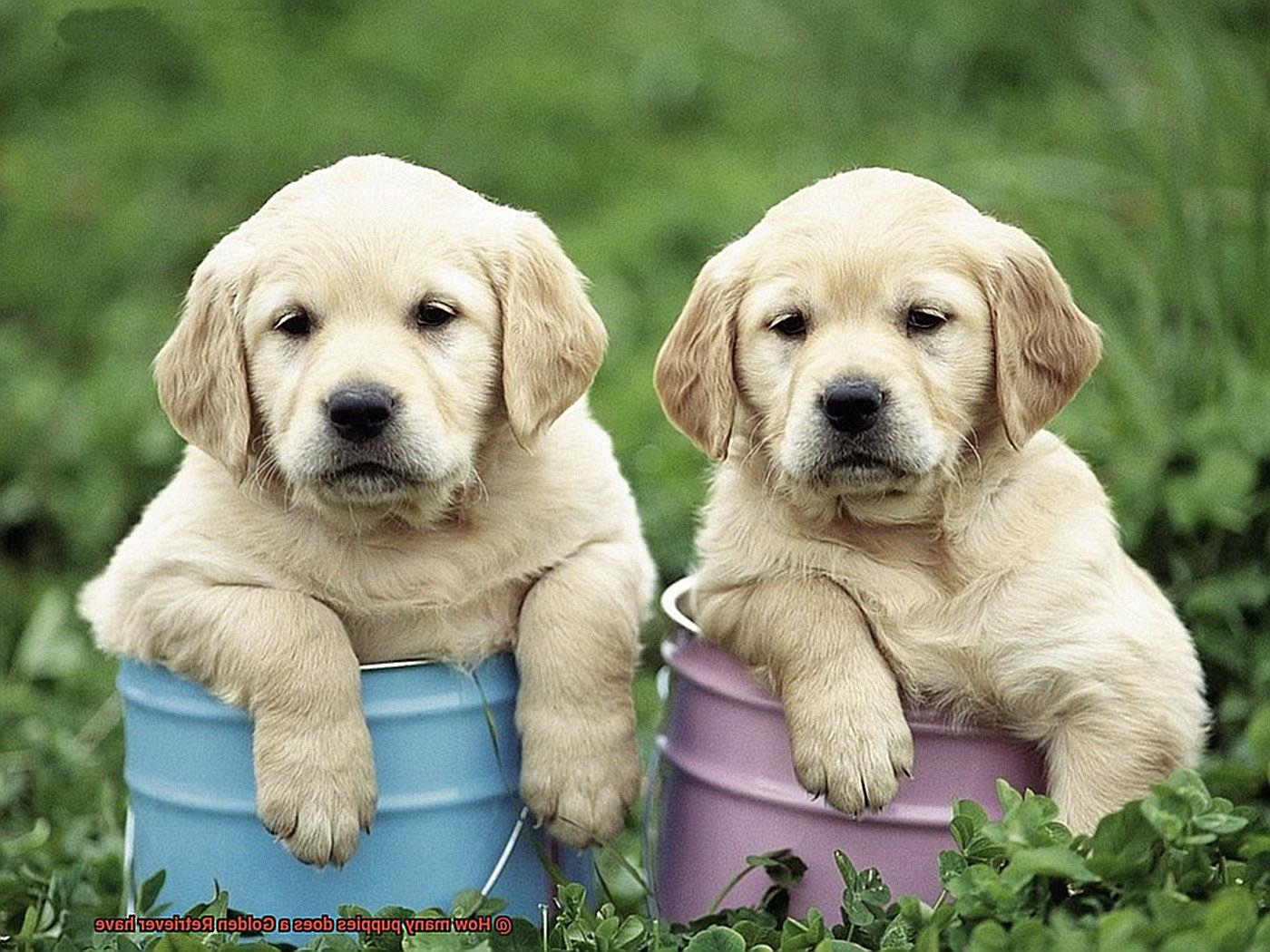Are you ready to welcome a Golden Retriever into your home? Or maybe you’re a breeder eager to expand your furry family. Either way, one question that’s likely on your mind is how many puppies can you expect from a Golden Retriever litter? Well, get ready for some surprises.
Golden Retrievers are beloved for their affectionate personalities and loyalty. They make fantastic companions, service dogs, and can live up to 12 years. When it comes to motherhood, they’re known for being nurturing and attentive.

But let’s get down to business: how many puppies can you expect from a Golden Retriever? The answer isn’t straightforward as it depends on several factors such as age, size, and overall health. While some may only have one or two pups in a litter, others could have an entire soccer team of twelve. Typically though, Golden Retrievers give birth to six to eight pups per litter.
In this blog post, we’ll delve into everything you need to know about Golden Retriever litters. From caring for the mother during pregnancy and after birth to understanding what affects the litter size. Get ready for all the information you need before welcoming these bundles of joy into your life.
What is a Golden Retriever?
Contents
Golden Retrievers are a popular breed of dog that has won the hearts of countless families all over the world. These medium to large-sized dogs are known for their friendly and gentle nature, making them perfect family pets. But what exactly sets them apart from other breeds, and why are they so beloved?
First and foremost, Golden Retrievers were originally bred in Scotland in the mid-1800s as hunting dogs. As classified sporting dogs, they have a strong desire to work hard and excel in activities such as obedience training, agility, and field trials. Their well-muscled and athletic build allows them to keep up with their owners on long hikes or runs, making them great companions for active individuals.

One of the defining features of a Golden Retriever is their distinctive golden coat. This dense, wavy, and water-repellent fur not only adds to their beauty but also serves a purpose – to keep them warm and dry while retrieving game from water. Their broad head with floppy ears and expressive dark brown eyes give them an adorable appearance that is hard to resist.
But it’s not just their looks that make Golden Retrievers so special. They are also known for their friendly temperament and desire to please their owners. These dogs are highly trainable, intelligent, and make excellent family pets. In fact, Golden Retrievers are often used as therapy dogs due to their calm and gentle nature.
When considering adding a Golden Retriever to your family, it’s important to note that they typically have six to eight puppies per litter. However, factors such as the age and health of the mother dog as well as genetics can influence litter size. It’s crucial to consult with a veterinarian before breeding your dog or purchasing a Golden Retriever puppy.
How Many Puppies Does a Golden Retriever Have?
Golden Retrievers are one of the most popular dog breeds, known for their friendly nature and loyalty. If you’re a proud Golden Retriever owner, you might be curious about how many puppies your furry friend can have in a single litter.
On average, Golden Retrievers give birth to six to eight puppies, but there’s always a chance for a surprise. It’s not uncommon for a Golden Retriever to have up to ten or twelve puppies in one litter. However, as with all dog breeds, various factors can influence the size of the litter. The mother’s age and health, the size of the father, and genetics can all play a role.
While having a larger litter might seem like fun, it can also come with some challenges. A bigger litter can put additional strain on the mother and require extra care and attention from the owner. Additionally, having more puppies in one litter may result in smaller puppies or an increased risk of complications during birth.
As a responsible owner, it’s crucial to provide proper care and support for both the mother and her puppies during pregnancy and after birth. This includes regular check-ups with a veterinarian, ensuring proper nutrition and exercise, and monitoring for any signs of illness or distress.
Factors That Influence Litter Size
From age to health to previous litters, there are several key factors that can influence how many puppies a mother will have in a given pregnancy.
One of the critical factors is age. As dogs age, their eggs may become less fertile, leading to smaller litters. This means that younger Golden Retrievers tend to have smaller litters than older dogs.
However, the health of the mother is also crucial. A healthy dog is more likely to have a larger litter than one who is not in good health. Issues such as bacterial infections or being underweight can negatively affect her ability to carry and deliver healthy puppies.
Moreover, previous litter size can also play a role. Dogs who have had larger litters before may be more likely to have larger litters in future pregnancies. However, this isn’t always the case, as some dogs may have smaller litters even if they’ve had larger ones in the past.
It’s important to note that every pregnancy is unique, and there are no guarantees about litter size. However, by taking proper care of your dog’s health and monitoring her closely during pregnancy, you can help ensure that she delivers healthy puppies.
The Age of the Mother Dog
Firstly, younger dogs between one and two years old will typically have smaller litters than more mature ones. This is because their reproductive system is still developing, which means they may not have as many eggs to fertilize. Generally, first-time mother Golden Retrievers will have an average litter size of around four to six puppies.
However, as your furry friend gets older, their litter size tends to increase. Dogs between three and five years old can have larger litters of up to eight or nine puppies. The reason for this is that their reproductive system is now fully developed, resulting in more eggs being available for fertilization.
But here’s a twist. Once a Golden Retriever reaches six years or older, their litter size may start decreasing again. This is because, like humans, dogs’ fertility declines with age. As their reproductive system becomes less efficient, it can lead to a decrease in the number of puppies they can have.
While age is an essential factor that impacts litter size, it’s not the only one. Genetics, health, and nutrition also play a crucial role in determining litter size. Ensuring your Golden Retriever receives proper care and nutrition throughout their life is vital for their overall health and fertility.
The Health of the Mother Dog
Before even beginning to think about breeding, it is essential to ensure that the mother dog is in tip-top shape.
Regular check-ups with a trusted veterinarian are paramount to ensure that the mother dog is up to date on all vaccinations and free from any illnesses or diseases. This ensures that the puppies will be born healthy and strong, with the best chance at a happy life.
During pregnancy, the mother dog’s nutritional needs increase significantly. It is crucial to provide her with a balanced and nutritious diet that meets her increased energy requirements. Fresh water is equally important, as dehydration can cause a host of health problems for both the mother dog and her developing puppies.
Keeping track of the mother dog’s weight throughout pregnancy is also essential. Gradual weight gain is normal, with most of it occurring in the final few weeks before delivery. Any sudden weight gain or loss can be a sign of underlying health issues that should be addressed immediately by a veterinarian.
Genetics and Litter Size
Genetics is undoubtedly one of the most important factors that influence how many puppies a mother will bear. The genes of the parents can play a significant role in determining litter size, but it is essential to keep in mind that other factors such as age, health, and nutrition can also impact the number of puppies born.
One fascinating finding is that larger female Golden Retrievers tend to have larger litters than smaller ones. This is because they have more space in their uterus to accommodate more puppies. In contrast, older female Golden Retrievers tend to have smaller litters than younger ones because their reproductive system is not as efficient as it once was.
The health of the mother also significantly impacts litter size. If the mother is unhealthy or has an underlying medical condition, it can result in smaller litter sizes. Conversely, a well-nourished and hydrated female Golden Retriever is likely to have larger litters than one who is not.
It is worth noting that while genetics and other factors can influence litter size, there can be variations within the same breed and even within the same litter. The average litter size for Golden Retrievers typically ranges between 6 to 8 puppies, but it is not uncommon for a Golden Retriever to have anywhere from 1 to 12 puppies in a single litter.
Conclusion
To sum up, Golden Retrievers are a popular breed known for their adorable personalities and loyalty. If you’re thinking of adding one to your family or breeding them, it’s crucial to know how many puppies they typically have in a litter. While the average size is six to eight, various factors can influence the number of pups, such as age, genetics, nutrition and health.
It’s essential to provide proper care and support for both the mother and her puppies during pregnancy and after birth. This includes regular check-ups with a veterinarian, ensuring proper nutrition and exercise, monitoring for any signs of illness or distress, and providing a safe and comfortable environment for the mother and her pups.
Golden Retrievers are highly trainable dogs that love to work hard in activities such as obedience training, agility, and field trials. Their athletic build allows them to keep up with their owners on long hikes or runs. With their affectionate nature and loyalty, they make fantastic companions and service dogs.
In conclusion, whether you’re an experienced breeder or a first-time owner, knowing how many puppies to expect from a Golden Retriever litter is crucial in ensuring the health and well-being of both the mother dog and her pups.









